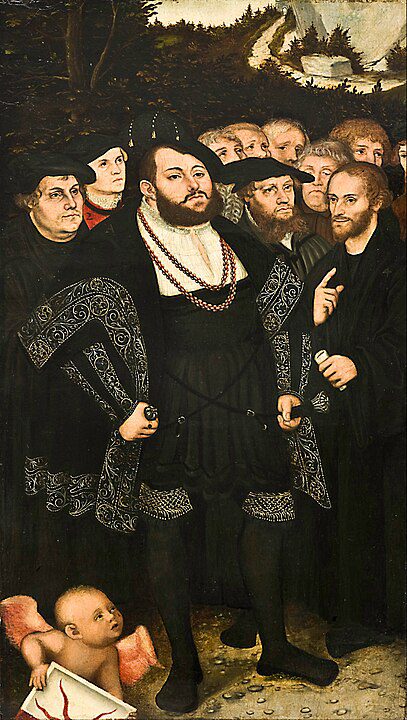Luther is often accused of being too deferential to earthly rulers. But in Temporal Authority, whose 500th anniversary we mark this year, he says this:
You must know that from the beginning of the world a wise prince is a rare bird indeed1; still more so a pious prince. They are usually the greatest fools or the worst knaves on earth; therefore one must constantly expect the worst from them and look for little good from them, especially in divine matters, which concern the salvation of souls. They are God’s jailers and hangmen, and His divine wrath needs them to punish the wicked and preserve outward peace. Our God is a great Lord, and therefore must have such noble, honorable and rich hangmen and beadles, and desires that they shall have riches, honor and fear, in full and plenty, from every one. lt pleases His divine will that we call His hangmen gracious lords, fall at their feet and be subject to them in all humility, so long as they do not ply their trade too far and desire to become shepherds instead of hangmen. (p. 258)
Despite this rather comical putdown, Luther goes on to explain how rulers should exercise their God-given authority:
For if they are born princes or chosen to office, they think only that it is their right to be served and to rule with power. He who would be a Christian prince certainly must lay aside the intention to rule and to use force. For cursed and condemned is every kind of life lived and sought for selfish profit and good; cursed are all works not done in love. But they are done in love when they are directed with all one’s heart, not toward selfish pleasure, profit, honor, ease and salvation, but toward the profit, honor and salvation of others. (263)
He must consider his subjects and rightly dispose his heart toward them in this matter. He does this if he applies his whole mind to making himself useful and serviceable to them, and does not think, “Land and people are mine; I will do as I please”; but thus, “I belong to land and people; I must do what is profitable and good for them. My concern must be, not how I may rule and be haughty, but how they may be protected and defended by a good peace.”
And he should picture Christ to himself, and say, “Behold, Christ the chief Ruler came and served me, sought not to have power, profit and honor from me, but only considered my need, and did all He could that I might have power, profit and honor from Him and through Him. I will do the same, not seek mine own advantage in my subjects, but their advantage, and thus serve them by my office, protect them, give them audience and support, that they, and not I, may have the benefit and profit by it.” Thus a prince should in his heart empty himself of his power and authority, and interest himself in the need of his subjects, dealing with it as though it were his own need. Thus Christ did unto us; and these are the proper works of Christian love. (264-265)
From Luther’s treatise, “Secular Authority: To What Extent Should It Be Obeyed,” from Works of Martin Luther, Vol. 3 (Philadelphia: A. J. Holman and Castle Press, 1930). Via Concordia Theological Seminary, Media Resources: https://media.ctsfw.edu/Text/ViewDetails/14900
This goes to the heart of Luther’s doctrine of vocation, the purpose of which–no matter the vocation– is loving and serving one’s neighbors. Not self-fulfillment; not glorifying God by how great you are; not even to serve God, as such. But to do as God directs those who wish to serve Him: Serve your neighbors, whom I will bring into your life through your vocation.
Those with vocations of authority must also use their office not for self-aggrandizement, but to love and serve those whom God has placed into their care. This applies to earthly rulers, government officials, heads of state, military officers, and other temporal authorities. God has not given you power to make your subjects bow and scrape before you so that you can think, “Land and people are mine; I will do as I please.” Rather, you are to use your power and your authority to serve them.
You are enjoying your high social status, but this is little more than God’s joke. You are His hangman–a notoriously low status job in the 16th century–who must punish evildoers to protect society. But it pleases God that His hangmen “shall have riches, honor and fear, in full and plenty, from every one” and that “we call His hangmen gracious lords.”
But the ruler earthly should “should in his heart empty himself of his power and authority, and interest himself in the need of his subjects.”
This applies not only to political rulers but to everyone with vocations that involve exercising authority over others in the workplace, the church, and the family.
Luther’s teaching here is simply that of Christ, who says as much when James and John asked to be seated next to Him in His glory, to the indignation of the other disciples:
And Jesus called them to him and said to them, “You know that those who are considered rulers of the Gentiles lord it over them, and their great ones exercise authority over them. But it shall not be so among you. But whoever would be great among you must be your servant, and whoever would be first among you must be slave of all. For even the Son of Man came not to be served but to serve, and to give his life as a ransom for many.” (Mark 10:42-45)
Illustration: Luther and the Wittenberg Reformers [with Elector John Frederick the Magnanimous] (1543) by Lucas Cranach the Younger – ~, Public Domain, https://commons.wikimedia.org/w/index.php?curid=21977954













